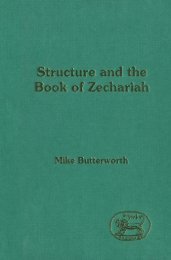Appendix CASE ONE - Collection Point® | The Total Digital Asset ...
Appendix CASE ONE - Collection Point® | The Total Digital Asset ...
Appendix CASE ONE - Collection Point® | The Total Digital Asset ...
You also want an ePaper? Increase the reach of your titles
YUMPU automatically turns print PDFs into web optimized ePapers that Google loves.
104 Legal History in the Making<br />
challenged the powers of the Cavalier Parliament. 40<br />
On 24 August 1680 Guilelmus Blakader, Scotus, was next, also at Leyden;<br />
he disputed about 'Lithiasis'. 41 Because the Greek word lithiasis means 'stone'<br />
or 'gravel' we are very probably dealing with a medical dissertation and a<br />
mistake in the Cataloguspromotorum. <strong>The</strong> last comer was Hugo Reid, a 'Scoto-<br />
Britannus'. He matriculated at Leyden in 1721 and took his degree in law on<br />
13 August 1722 disputing de Praeparatione bills in hepate. 42 <strong>The</strong> subject of the<br />
disputation, the preparation of the bile in the liver, indicates that this is again a<br />
doctorate of medicine and a mistake in the Catalogue: during two centuries not<br />
seven but only five Scotsmen took the highest law degree at a Dutch university.<br />
<strong>The</strong> number of medical doctorates amounted to 138 in all. In this figure is<br />
included the doctorate of Duncan Cuminius, conferred on him on 30 June<br />
1684 after a public defence of his dissertation, De Cerebro eiusque pathologia<br />
in genere. <strong>The</strong> steps the English envoy took before Professor Drelincourt to<br />
prevent the promotion were frustrated by the Academic Senate:<br />
iudicavit Senatus ad se non pertinere iudicium de rebus politicis, sed de eruditione in<br />
qualibet facultate, idque liberum semper fuisse Academiae, neque illam libertatem<br />
aut posse aut velle abnegare. 43<br />
Our Scots law students were likely to be innocent of disputationes inaugurates<br />
aut pro gradu: they went abroad because it was considered more honourable<br />
to pass the Faculty of Advocates' examination in civil law, which included an<br />
examination on a title of the Digest by a committee of examiners appointed by<br />
the Faculty. 44 For admission to the Faculty of Advocates it was not necessary<br />
to take a law degree abroad but a Latin thesis had to be written which<br />
would be discussed at the examination. Did the Scots law students prepare<br />
themselves for these theses by active participation in so educative a practice<br />
as disputing exercitii gratia? Answering this question is not very easy because<br />
the disputations at issue have not been preserved systematically. In so far as<br />
they were written by the professors praesides and published in volumes under<br />
their names, library catalogues give some help; on the 'loose' disputations<br />
of which sometimes the student was auctor et respondens and which might<br />
inform us about his personal contribution, a researcher can very rarely set<br />
eyes. As yet in my investigation of Scottish students I have not produced<br />
40<br />
G.M. Trevelyan, A Shortened History of England (Harmondsworth, 1959), 342-43. Hamilton<br />
praises the light burden of English taxation: 'In Anglia sunt levissimae (sc. taxationes), etiamsi tot<br />
quotidie de eorum oneribus audiantur querimoniae & murmura' (Disputatio, fo.B 3 verso).<br />
41<br />
See Molhuysen, Bronnen, iii, 332*. I did not find William Blakader in the matriculation lists. Cf.<br />
D.N.B., ii, 578 (Blackadder).<br />
42<br />
Molhuysen, Bronnen, iv, 284*. On 17 June 1721 'Hugo Reid, Scotus, [Aet.] 20' matriculated at<br />
Leyden as a medical student (Album studiosorum, col. 874).<br />
43<br />
See Molhuysen, Bronnen, iv, 26 and 195*.<br />
44<br />
Feenstra, 'Legal relations', 131 and n.22. Murdoch, at p.150, says that the Faculty of Advocates'<br />
examination included a lecture to the judges of the Court of Session on a title from the Digest assigned<br />
by the Dean of Faculty. It was not until 1750 that advocates were required to pass an examination in<br />
Scots law. Those who chose the examination in Scots law introduced in the previous century did not give<br />
a lecture before the judges.






